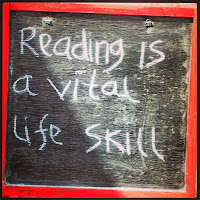Maintaining Student Reading Across the Summer Break
Annie Dillard in her book, The Writing Life, suggests that a writer must be careful what he or she reads, for that is what will be written. The writer is careful of what he or she learns, because that becomes what is known. But what happens when the reading and consequently the writing ceases?
Reading is essential to every writer, so when the school year ends it is critical that these developing skills continue to be fostered in our youngest literate citizens.
Reading
research indicates that many children’s reading abilities decline between the
end of one school year and the beginning of the next when reading ceases. Some parents see reading as the province of the school. It may not be valued in the home. Amazingly, this phenomenon of summer reading loss can be
offset by reading as few as 4- 5 books across the summer break. (Rinn 2006)
Professors, Richard Allington and Anne McGill-Franzen
completed a three-year study (2001-2004) showing a significantly higher level
of reading achievement in students who received books for summer reading at
home. The summer reading setback is the primary reason for the reading
achievement gap between children who have access to reading materials at home
and those who do not. Students who do not have books at home miss out on
opportunities to read. Those missed opportunities begin to add up. To quote
Allington:
‘What we know is
that children who do not read in the summer lose two to three months of reading
development, while kids who do read tend to gain a month of reading proficiency.
This creates a three to four month gap every year. Every two or three years the
kids who don't read in the summer fall a year behind the kids who do.’
Naturally, we
would love it if our students read more than 4-5 books, but it’s certainly a
beginning.
The effect of
putting these ideas into practice would be that a link becomes clearly
established between summer and reading, Most importantly, we promote the idea
of reading beyond the school. Too many students spend the entire summer break in book free environments. Summer for many of us, is the reading season. As
a literate society, we should want this to be an expectation for each generation.
I call on you
to consider the following suggestions for launching a summer initiative at your
school.
Provide lots of
opportunities for students to recommend books to each other. Make these reading recommendations
visible across the school. In the library, classroom, the entrance to the
school, hallways and corridors. Make announcements about book recommendations
in the school newsletter, school website. Discussing reading recommendations
sends a clear message that summer reading is an expectation. You are also
providing some titles to consider.
Encourage children to
create lists of books they would like to read. Send the lists home for
discussion. This is creating goal
setting around reading. Young readers will begin the summer with a plan and some specific
titles.
Consider loaning books
from the school library.
The school library may be the only source of books for some students. When
school closes, the reading dries up if access is denied. It is a tragedy that school libraries across the entire nation go into lock down across the summer. I am pleased that more schools are opening up opportunities for summer reading by allowing students to take books home over the summer. Others are opening on certain days over the summer to facilitate borrowing. Great initiatives!
Link
families to community based activities over the summer. Local library programs
provide access to books, storytelling, and related print activities. Schools can work more closely with these agencies
to develop opportunities for children to read and write over the summer.
Book
Exchanges
are an inexpensive way for children to access reading. Schools can set up this
type of initiative fairly easily. Invite children to donate old books from home
and exchange it for another is a simple way of continued reading over the
summer. For each book a student donates they receive a ticket which can be
exchanged for another book. The school (and teachers) could take the
opportunity to cull some titles and donate tickets to students who have no
books. Books left over could be donated to local community organizations,
charities as a means of pushing more books into the community, and therefore
stimulate reading/writing. Schools could be proactive by encouraging the
donation of books. Setting up a ‘free book’ tables is a further
step in promoting the link between students and reading. ‘Dollar a Book Day’
sales could be arranged to encourage reading and to generate additional funds
for the purchase of additional books.
Have children track their summer reading.
It can be helpful to record the books being read. Not only will it help to
track progress, the tracker sheet can provide a source of conversation.
Explore online reading sites for young readers.
Host
a library card sign up event and encourage parents to sign up for library cards for
themselves and their children.
Encourage
parents to dedicate regular time for daily reading and encourage children to
take books with them when travelling with their families. Children spend
a lot of time waiting for adults to complete tasks. Having a book with them can
help children to better deal with such delays.
Summer
reading should be fun.
Remember that children need free time in the summer to relax and enjoy the
pleasures of childhood. A gentle reminder to parents may be prudent. Reading should add to the pleasure gained from being on vacation.
Me, I'm off to enjoy the reading season...







Comments
Post a Comment